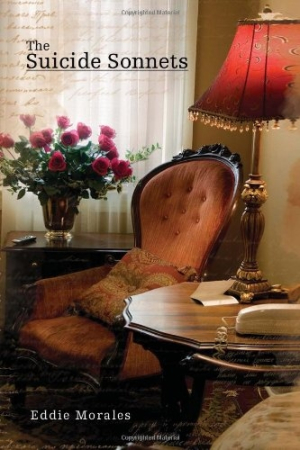The Suicide Sonnets
Eddie Morales’ poetry collection, The Suicide Sonnets, is a meditation on what suicide really entails. Rather than deal with the aftermath of such a death, these poems crawl into the psyche of someone truly considering ending their life. The poems are unflinching in their account of someone’s descent into blackness. The 76 compact sonnets in the collection chronicle the emotional journey of someone traveling from one end of the mental spectrum to the other.
The sonnet form is perfect for this collection. Instead of grappling with the age-old topic of love, the poems are dark, cycling through the depths of the speaker’s despair. The rhyme scheme deftly mimics the draining repetition of depression. Morales’ end lines are full of rich word play. In fact, if you lined up the end words, the reader would still grasp the poems’ meaning and tone. For example, Morales ends the lines of “LXXI” with such words as “dispel,” “soul,” “time,” “man,” and “crime.” This poet has a firm grasp of the form, and on how to create rhymes that build another layer of metaphor.
There are sharp moments in this piece that may cause the reader’s hair to stand on end. Never are the poems too gory or voyeuristic about suicide and depression. Instead, they get right to the point. For example, Morales opens “XVII” with the following lines, “My shiny blade knows where to make the cut, / A slice across – and deeply – where it’s good.” This blunt opening shows the reader just how serious this situation is.
Morales tackles difficult subject matter, but there are times when the poems spin in circles and seem like mirrors to one another. In fact, many of the poems sound the same. On one level, this makes sense since depression can be a near-constant murmur. On the other hand, it can slow the pace of the collection to a crawl.
The emotional effects of someone on the brink of suicide, could have used fresher images and metaphors to make the poems stand out. In “XIII,” Morales describes the heart as “made black by the soot of life!” Such moments are too loud and obvious when grappling with the complexities of suicide, depression, and a person dreaming of death. More restraint would have made for a more nuanced group of poems.
At the start of this collection, the poems’ speaker is in the messy gut of depression. By dividing the collection into three sections, Morales shows the full cycle of mental illness, and that depression does not have to be the end. Instead, after one enters hell and dwells in purgatory, a rebirth is more than possible. By the end of the book, the speaker finally realizes that “night is chased by dawn.”
Reviewed by
Lisa Bower
Disclosure: This article is not an endorsement, but a review. The publisher of this book provided free copies of the book and paid a small fee to have their book reviewed by a professional reviewer. Foreword Reviews and Clarion Reviews make no guarantee that the publisher will receive a positive review. Foreword Magazine, Inc. is disclosing this in accordance with the Federal Trade Commission’s 16 CFR, Part 255.

